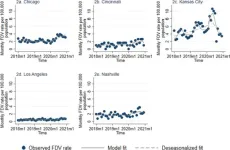(Press-News.org) A cancer drug currently in the final stages of clinical trials could offer hope for the treatment of a wide range of inflammatory diseases, including gout, heart failure, cardiomyopathy, and atrial fibrillation, say scientists at the University of Cambridge.
In a study published today in the Journal of Clinical Investigation, the researchers have identified a molecule that plays a key role in triggering inflammation in response to materials in the body seen as potentially harmful.
We are born with a defence system known as innate immunity, which acts as the first line of defence against harmful materials in the body. Some of these materials will come from outside, such as bacterial or viral infections, while others can be produced within the body.
Innate immunity triggers an inflammatory response, which aims to attack and destroy the perceived threat. But sometimes, this response can become overactive and can itself cause harm to the body.
One such example of this is gout, which occurs when urate crystals build up in joints, causing excessive inflammation, leading to intense pain. Another example is heart attack, where dead cell build up in the damaged heart – the body sees itself as being under attack and an overly-aggressive immune system fights back, causing collateral damage to the heart.
Several of these conditions are characterised by overactivation of a component of the innate immune response known as an inflammasome – specifically, the inflammasome NLRP3. Scientists at the Victor Phillip Dahdaleh Heart and Lung Research Institute at Cambridge have found a molecule that helps NLRP3 respond.
This molecule is known as PLK1. It is involved in a number of processes within the body, including helping organise tiny components of our cells known as microtubules cytoskeletons. These behave like train tracks inside of the cell, allowing important materials to be transported from one part of the cell to another.
Dr Xuan Li from the Department of Medicine at the University of Cambridge, the study’s senior author, said: “If we can get in the way of the microtubules as they try to organise themselves, then we can in effect slow down the inflammatory response, preventing it from causing collateral damage to the body. We believe this could be important in preventing a number of common diseases that can cause pain and disability and in some cases can lead to life-threatening complications.”
But PLK1 also plays another important role in the body – and this may hold the key to developing new treatments for inflammatory diseases.
For some time now, scientists have known that PLK1 is involved in cell division, or mitosis, a process which, when it goes awry, can lead to runaway cell division and the development of tumours. This has led pharmaceutical companies to test drugs that inhibit its activity as potential treatments for cancer. At least one of these drugs is in phase three clinical trials – the final stages of testing how effective a drug is before it can be granted approval.
When the Cambridge scientists treated mice that had developed inflammatory diseases with a PLK1 inhibitor, they showed that it prevented the runaway inflammatory response – and at a much lower dose than would be required for cancer treatment. In other words, inhibiting the molecule ‘calmed down’ NLRP3 in non-dividing cells, preventing the overly aggressive inflammatory response seen in these conditions.
The researchers are currently planning to test its use against inflammatory diseases in clinical trials.
“These drugs have already been through safety trials for cancer – and at higher doses than we think we would need – so we’re optimistic that we can minimise delays in meeting clinical and regulatory milestones,” added Dr Li.
“If we find that the drug is effective for these conditions, we could potentially see new treatments for gout and inflammatory heart diseases – as well as a number of other inflammatory conditions – in the not-too-distant future.”
The research was funded by the British Heart Foundation. Professor James Leiper, Associate Medical Director at the British Heart Foundation said: “This innovative research has uncovered a potential new treatment approach for inflammatory heart diseases such as heart failure and cardiomyopathy. It’s promising that drugs targeting PLK1 – that work by dampening down the inflammatory response – have already been proven safe and effective in cancer trials, potentially helping accelerate the drug discovery process.
“We hope that this research will open the door for new ways to treat people with heart diseases caused by overactive and aggressive immune responses, and look forward to more research to uncover how this drug could be could be repurposed.”
Reference
Baldrighi, M et al. PLK1 inhibition dampens NLRP3 inflammasome-elicited response in inflammatory disease models. JCI; 1 Nov 2023; DOI: 10.1172/JCI162129
END
Cancer drug could hold hope for treating inflammatory diseases including gout and heart diseases
2023-11-01
ELSE PRESS RELEASES FROM THIS DATE:
New cancer drug shows promise targeting genetic weakness in tumors, comments Virginia Tech expert
2023-11-01
Imagine the body’s cells are well-behaved students in the classroom. The “teachers” are tumor suppressor genes, and they make sure cells follow the rules. But when tumor suppressor genes are away, cells may go astray.
With cells, this is a serious matter. Unregulated behavior can lead to uncontrolled growth and, ultimately, the development of cancer.
In an invited review article Wednesday (Nov. 1, 2023) in Cancer Discovery, a journal of the American Association for Cancer Research, Kathleen Mulvaney, assistant professor with the Fralin Biomedical Research Institute at VTC, talks about the ...
Marine oxygen landscape shaped by plate movement and biological innovation
2023-11-01
The oxygen content of seawater has a profound impact on the cycling of bioessential elements and the habitability of Earth. But how and why the marine oxygen landscape (i.e., the spatial pattern of oxygen levels) evolved since the start of the Phanerozoic 538 million years ago is not well established.
To tackle this problem, researchers led by Prof. WANG Xiangli from the Institute of Geology and Geophysics of the Chinese Academy of Sciences (IGGCAS) and Prof. LI Chao from the Chengdu University of Technology, along with collaborators from the University of Cincinnati and the Nanjing Institute of Geology and Palaeontology, have reconstructed a nearly continuous record of ...
Having a bad boss makes you a worse employee
2023-11-01
uIf your boss stomps and yells, criticizes you, and then proceeds to take the credit for your work – even it is an isolated incident – it can take a profound toll on employee well-being and performance. But despite the many years of research, the precise mechanisms through which bad leadership impacts employees’ performance remain a subject of interest.
In a new study, first published online Oct. 30 in Group & Organization Management, an international group of researchers, led by Stevens Institute of Technology and University of Illinois Chicago, offer a novel explanation of the cognitive factors through which abusive ...
Non-invasive technology maps brain activity to investigate behavior changes in neurological disease
2023-11-01
A research team led by Cleveland Clinic and Oregon Health and Science University (OHSU) has developed a new method for mapping how the parts of the brain "speak" to each other, critical to understanding behavior changes in patients with neurological disease.
Diseases like Alzheimer's disease change how patients communicate and act, affecting their relationships and well-being. Cleveland Clinic's Hod Dana, PhD, is collaborating with Jacob Raber, PhD, an OHSU behavioral neuroscientist, on ...
NIH funding helps Ghose Lab invest in innovative imaging equipment
2023-11-01
UTA will soon add a new piece of cutting-edge equipment to its already impressive and growing research armamentarium—a type of super-resolution microscope (SRM) that allows biologists to see structures within a cell in even finer detail.
The SRM will come to UTA because of additional grant funding from the National Institutes of Health (NIH) to the lab of Piya Ghose, an assistant professor of biology at UTA. This nearly $250,000 award supplements Ghose’s existing NIH/National Institute of General Medical ...
Domestic violence involving firearms increased during COVID-19 pandemic
2023-11-01
(SACRAMENTO, Calif.) — Domestic violence went down or stayed the same during the first 10 months of the COVID-19 pandemic in five major U.S. cities. However, domestic violence involving firearms increased in three of those cities, according to a new UC Davis study published in the Journal of Family Violence.
“The increase in firearm domestic violence is concerning, as abuser firearm access is a risk factor for lethality,” said Elizabeth Tomsich, a research data analyst at the UC Davis Violence Prevention Research Center and ...
Microbiology: River plastics may harbour potential pathogens and antimicrobial resistance genes
2023-11-01
Microbial communities growing on plastic debris in rivers may have the capacity to harbour potentially pathogenic microbes and act as reservoirs of antimicrobial resistance genes, according to a study published in Microbiome. The findings also highlight differences in the potential pathogens and antimicrobial resistance genes that new and degraded plastics may have the capacity to harbour.
Vinko Zadjelovic, Elizabeth Wellington, Joseph Christie-Oleza and colleagues characterised the microbial communities found on the surface ...
High metabolism is an early sign of Alzheimer’s disease
2023-11-01
An early phase in the process of developing Alzheimer’s disease is a metabolic increase in a part of the brain called the hippocampus, report researchers from Karolinska Institutet in a study published in Molecular Psychiatry. The discovery opens up for new potential methods of early intervention.
Alzheimer’s disease is the most common form of dementia and strikes about 20,000 people in Sweden every year. Researchers now show that a metabolic increase in the mitochondria, the cellular power ...
Trust is the most important factor for British South Asians when taking part in genetic research to tailor medications
2023-11-01
Researchers from Queen Mary University of London have gathered detailed insights from the British South Asian community that could lead to more successful implementation of genetic testing to help tailor the use of routine medications. Their findings are published today (1 November 2023) in The Pharmacogenomics Journal and indicate key issues that could affect the take up of this new type of genetic testing amongst patients.
Despite comprising 10% of the British population, individuals of South Asian heritage have historically been under-represented in ...
Cigarette style warning labels could reduce people’s meat consumption
2023-11-01
Cigarette style graphic warning labels could reduce people’s meat consumption, according to new research published today (1 November).
The study suggests the use of warning labels on meat options could improve public health and reduce the UK’s carbon footprint.
The team from Durham University tested a range of warning labels including those which warn people of the damage to climate, health, and risk of pandemics. They found that all labels were effective at discouraging people from choosing meals with meat.
All warning labels, which showed ...




